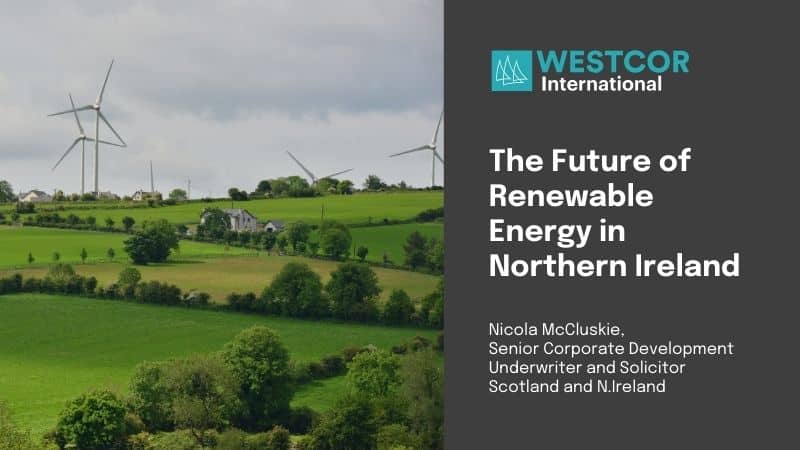The Future of Renewable Energy in Northern Ireland
Over the past decade, the political climate in Northern Ireland has hindered its renewable energy growth compared to other UK regions, especially Scotland.
Grid connection issues, infrastructure, the planning process, and market access have all been significant obstacles which have not been helped by the political stalemate. However, the new renewable energy electricity support scheme offers a promising future for renewables in Northern Ireland.
This initiative aims to make Northern Ireland’s energy sector more competitive, attracting investment, creating jobs, and stimulating growth. It is crucial for meeting the target of sourcing 80% of electricity consumption from renewables by 2030, as mandated by the Climate Change Act (Northern Ireland) 2022. To meet this ambitious target, the development process must be made as easy as possible. Title indemnity insurance can play a large part in this.
Onshore Wind
Wind power is the dominant electricity source in Northern Ireland, accounting for 82.9% of all electricity generated in 2023. This dominance is due to the region’s favourable climate, geographical location, and terrain.
Given initial wind power developments first appeared over 20 years ago, there is now potential for repowering and extending existing projects, as the original life span of the initial turbines will likely be coming to an end. Any repowered or extended developments may face land issues, such as securing additional land rights for new turbines and cabling, and negotiation of new access routes and rights, especially if increased blade size or tip height for new turbines leads to oversail of or overrun onto third-party land. There could also be concerns regarding mines, minerals, or turbary rights if further foundations are being built for new turbines.
Title insurance can protect against these development risks, providing the insured with comfort in relation to any potential delays in transporting turbines and blades to the project site, as well as safeguarding the project construction timetable and protecting third party investments.
Battery Storage
Battery storage projects are becoming increasingly common across Northern Ireland, as they are well-suited to both rural and industrial environments. However, these projects often face challenges such as the use of private roads without proper access rights, potential “gap” areas between public and private roads, and the need to construct visibility displays on third-party land to meet planning consent requirements.
These issues can be further complicated by unregistered land, where the owner(s) are unidentified or unknown.
Title insurance can mitigate these risks by protecting developers against a third party with a legal title interest in the relevant area preventing them from using this land for the development.
Solar and Offshore Wind
Residential solar panel installations are common, but large-scale commercial solar projects are less frequent in Northern Ireland, possibly due to the climate.
Offshore wind projects are still in their infancy, although a Statement of Intent between the Department for the Economy and the Crown Estate shows commitment to establishing offshore wind leasing and the Draft Offshore Renewable Energy Action Plan was a step towards delivering on the ambition of deploying 1 GW of offshore wind from 2030. There is, however, currently no NI equivalent to Scotland’s “Scotwind Leasing Round”.
A common issue with large-scale solar and offshore wind projects is securing cabling rights over various landholdings given the potential size of these projects. Offshore projects can require extensive cabling leading from the seabed to onshore substations, often crossing multiple landholdings over which the developer has no legal rights. Title insurance can assist in this scenario by providing cover in relation to a lack of formal rights to install and use cabling within identified land parcels.
Other Renewable Technologies
Recent developments in hydrogen production have been promising, with funding awarded to two green hydrogen projects through the UK Net Zero Hydrogen Fund. Hydrogen “hubs” are likely to become more common as the offshore sector progresses.
Northern Ireland also has a strong history of hydropower projects, and its rural landscape is conducive to anaerobic digestion plants. These projects would also benefit from title insurance to address any land/title defects given the often-complicated title background of the land used for these technologies.
How We Can Help
At Westcor, we offer tailored policies for known risks identified during the due diligence process, whether at the option agreement, lease, or sale/purchase stage. Coverage typically includes the capital expenditure for the project and may extend to loss of revenue or business interruption.
Title insurance is often considered at the option stage with developers not activating the policy until entering a lease or securing funding.
For onshore wind, solar or battery storage projects, portfolio-based coverage might be required, especially in share sales of operational assets. At Westcor, our Perfect Title policy provides cover against unknown title risks to protect portfolios offering investors, lenders and purchasers confidence in their investments. This approach is cost-effective and efficient for fast-paced bidding and due diligence processes.
Conclusions
Despite the challenges facing renewable energy development in Northern Ireland to date, many of these barriers are still prevalent across the rest of the UK. By introducing the renewable energy electricity support scheme in Northern Ireland, Northern Ireland has shown it is eager to help developers overcome some of these barriers, to become a major player in the UK renewables sector. Recent announcements regarding a new Contract for Difference auction process for Northern Ireland potentially taking place in 2025 are also encouraging.
To achieve Net Zero targets across the UK, rapid development is essential, and the new UK Government’s recent decision to lift the onshore wind power ban and provide a commitment to doubling wind power by 2030 provides hope for the sector. Those working predominantly in the NI energy sector will, however, be hoping that the feedback to the Draft Programme for Government (2024-2027) issued by the NI Executive results in more focused objectives and targets for the sector. The recent drop in renewables electricity generation in NI from 51% in 2022 to 45.8% as at the end of June 2024 will also hopefully serve as a timely reminder that much work is to be done to meet the NI targets.
The due diligence process for land aspects of renewables projects can cause delays but title indemnity insurance can be instrumental in overcoming these hurdles and ensuring a smooth and cost-efficient route to completion.
The Westcor team has a wide range of expertise within its teams across the UK and Ireland and is ready to assist with any queries related to this.
Feel free to contact us for further information or assistance.






